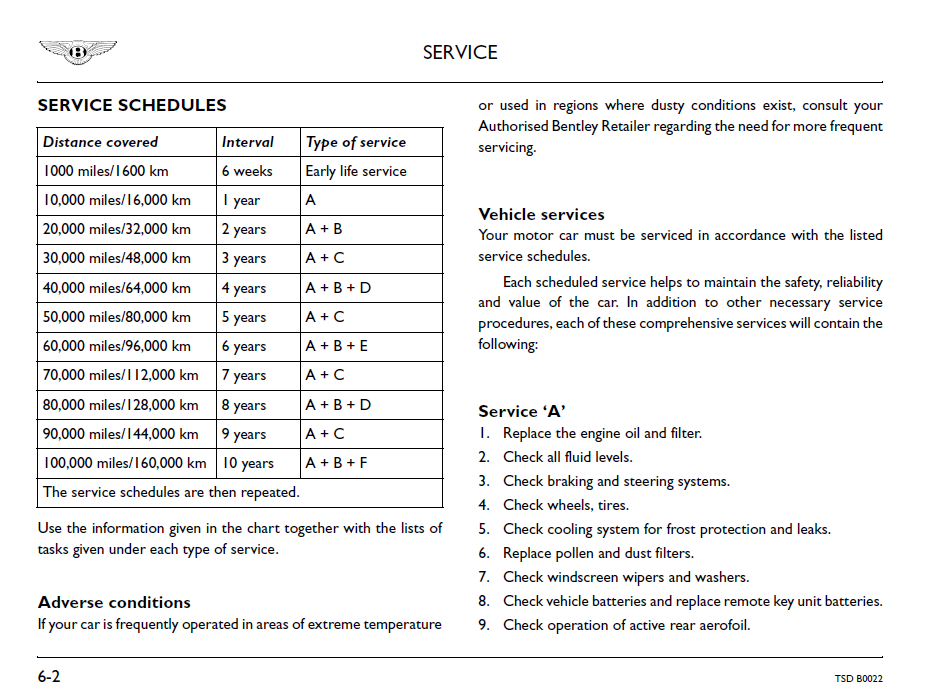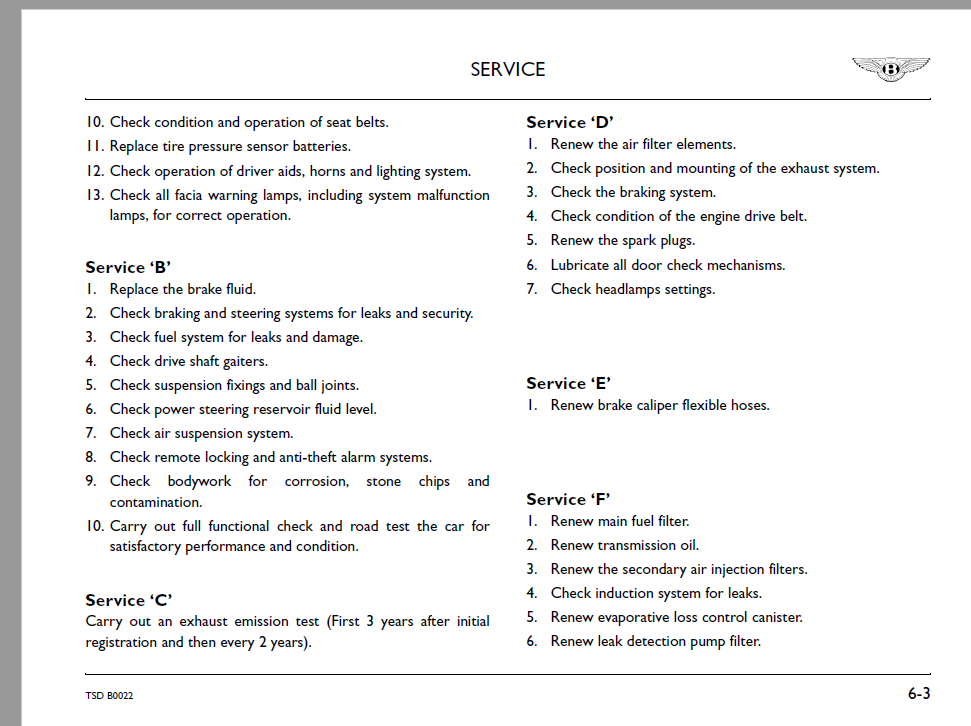Brake Fluid go bad if a car has been sitting for 3.5 years?
#1
Brake Fluid go bad if a car has been sitting for 3.5 years?
Got a Bentley Continental GT that has been sitting for 3.5 years with less than 100 miles. Dealer says everything is fine but would brake fluid go bad even if unused after 3.5 years?
#2
I would change it. It is such a small work to be done with around 100-150USD. It is not worth taking the risk that the fluid integrated some water over the years and then damage the brake system for just saving a few bucks. Plus: The car is really heavy so the last part that I personally wouold try to save money is on the braking 

#3
I would change it. It is such a small work to be done with around 100-150USD. It is not worth taking the risk that the fluid integrated some water over the years and then damage the brake system for just saving a few bucks. Plus: The car is really heavy so the last part that I personally wouold try to save money is on the braking 

Question this dealer foo. Hope he said to change oil and filter too.
#4
All depends on the mileage, have a look in the brake fluid reservoir if the fluid look dirty. brake fluid last many years but water contamination can accrue over time. As the guys have posted its best to be safe & flush it out, peace of mind ...
#5
Yes, I would flush it. Nothing to lose and a recommendation many manufacturers give. I do my cars approximately once every two years. In fact, just did my GT two weeks ago and mentioned in my rear brake pad change thread.
Brake fluid is hygroscopic and, in the old days, caused serious issues with braking integrity. These days, (for about 20 years now), water ingress is the lesser problem. Now the more important reason to flush with new fluid is the additive package in modern brake fluids become depleted. Once they're gone, the fluid becomes acidic and begins to leach copper out from brake lines and other components. Fluid too old can eventually breach a brake line. Rare, but can happen.
Brake fluid is hygroscopic and, in the old days, caused serious issues with braking integrity. These days, (for about 20 years now), water ingress is the lesser problem. Now the more important reason to flush with new fluid is the additive package in modern brake fluids become depleted. Once they're gone, the fluid becomes acidic and begins to leach copper out from brake lines and other components. Fluid too old can eventually breach a brake line. Rare, but can happen.
#6
Yes, I would flush it. Nothing to lose and a recommendation many manufacturers give. I do my cars approximately once every two years. In fact, just did my GT two weeks ago and mentioned in my rear brake pad change thread.
Brake fluid is hygroscopic and, in the old days, caused serious issues with braking integrity. These days, (for about 20 years now), water ingress is the lesser problem. Now the more important reason to flush with new fluid is the additive package in modern brake fluids become depleted. Once they're gone, the fluid becomes acidic and begins to leach copper out from brake lines and other components. Fluid too old can eventually breach a brake line. Rare, but can happen.
Brake fluid is hygroscopic and, in the old days, caused serious issues with braking integrity. These days, (for about 20 years now), water ingress is the lesser problem. Now the more important reason to flush with new fluid is the additive package in modern brake fluids become depleted. Once they're gone, the fluid becomes acidic and begins to leach copper out from brake lines and other components. Fluid too old can eventually breach a brake line. Rare, but can happen.
#7
If it is the rear center console, I've not done one, and I'd suggest Mr. Johnny.....He DAMAN!
Trending Topics
#8
Its the rear top on the headliner, boy its tuff don't want to break the lugs where ever they are ... Lol
#9
When in doubt flush it out and by the way only use Dot 4 brake fluid. Dot 4 has a higher boiling point then Dot 3. Dot 4 is required not recommended.
There is also a sequence of bleeding for the ABS. The procedure is performed through the Ross Tech vcds. There are a series of internal electronic pumps through the ABS that clear any residual old fluid in the system. Although the conventional brake bleeding is adequate it doesn't entirely clear the ABS. Perhaps someone who's familiar with this procedure could post a better explanation that I have?
There is also a sequence of bleeding for the ABS. The procedure is performed through the Ross Tech vcds. There are a series of internal electronic pumps through the ABS that clear any residual old fluid in the system. Although the conventional brake bleeding is adequate it doesn't entirely clear the ABS. Perhaps someone who's familiar with this procedure could post a better explanation that I have?
Last edited by 1eapplebaum; 04-18-2019 at 07:01 AM.
#12
The car has less than 100 miles but has been sitting almost 3.5 years unused. The Dealer response was "What Service? The car has less than 100 miles" so I asked for service managers opinion to check the brake fluid.
#13
How to do your own Brake Fluid Test ...
As with every other fluid in your car, brake fluid contains a main ingredient along with protective additives. The main ingredient in brake fluid doesn’t degrade, but the additives do. The most important additive is a corrosion inhibitor. The corrosion inhibitor prevents internal rusting of steel brake lines, calipers and ABS (antilock brake system) components. Once the inhibitors are exhausted, even minute amounts of moisture can cause dangerous and costly corrosion.
Most car manufacturers recommend a complete brake fluid flush every two years or 24,000 miles. Rather than rely on a general recommendation, you can test the actual condition of your brake fluid. To check your brake fluid, remove the cover of the master cylinder and dip a strip into the fluid. Shake off the excess fluid and wait 60 seconds before comparing the color of the strip with the guide on the brake fluid tester package.
As with every other fluid in your car, brake fluid contains a main ingredient along with protective additives. The main ingredient in brake fluid doesn’t degrade, but the additives do. The most important additive is a corrosion inhibitor. The corrosion inhibitor prevents internal rusting of steel brake lines, calipers and ABS (antilock brake system) components. Once the inhibitors are exhausted, even minute amounts of moisture can cause dangerous and costly corrosion.
Most car manufacturers recommend a complete brake fluid flush every two years or 24,000 miles. Rather than rely on a general recommendation, you can test the actual condition of your brake fluid. To check your brake fluid, remove the cover of the master cylinder and dip a strip into the fluid. Shake off the excess fluid and wait 60 seconds before comparing the color of the strip with the guide on the brake fluid tester package.
#14
But, back to the brake fluid. Brake fluids, being hygroscopic, WILL absorb moisture EVEN standing still for 3.5 years. Here are the service requirements from the factory, along with the service type. It would appear the factory recommends a 2 year interval on brake fluid replacement given it is on the "B" list.


One caveat, these recommendation are for the first series Continentals, and if you car is more like a 2015/2016, they might have been updated.
#15
How to do your own Brake Fluid Test ...
As with every other fluid in your car, brake fluid contains a main ingredient along with protective additives. The main ingredient in brake fluid doesn’t degrade, but the additives do. The most important additive is a corrosion inhibitor. The corrosion inhibitor prevents internal rusting of steel brake lines, calipers and ABS (antilock brake system) components. Once the inhibitors are exhausted, even minute amounts of moisture can cause dangerous and costly corrosion.
Most car manufacturers recommend a complete brake fluid flush every two years or 24,000 miles. Rather than rely on a general recommendation, you can test the actual condition of your brake fluid. To check your brake fluid, remove the cover of the master cylinder and dip a strip into the fluid. Shake off the excess fluid and wait 60 seconds before comparing the color of the strip with the guide on the brake fluid tester package.
As with every other fluid in your car, brake fluid contains a main ingredient along with protective additives. The main ingredient in brake fluid doesn’t degrade, but the additives do. The most important additive is a corrosion inhibitor. The corrosion inhibitor prevents internal rusting of steel brake lines, calipers and ABS (antilock brake system) components. Once the inhibitors are exhausted, even minute amounts of moisture can cause dangerous and costly corrosion.
Most car manufacturers recommend a complete brake fluid flush every two years or 24,000 miles. Rather than rely on a general recommendation, you can test the actual condition of your brake fluid. To check your brake fluid, remove the cover of the master cylinder and dip a strip into the fluid. Shake off the excess fluid and wait 60 seconds before comparing the color of the strip with the guide on the brake fluid tester package.






